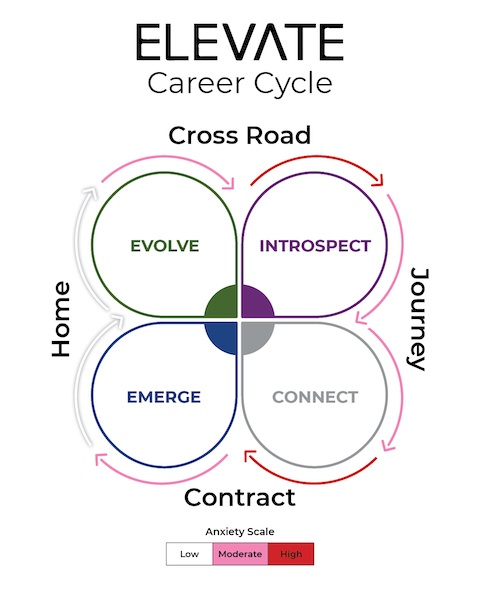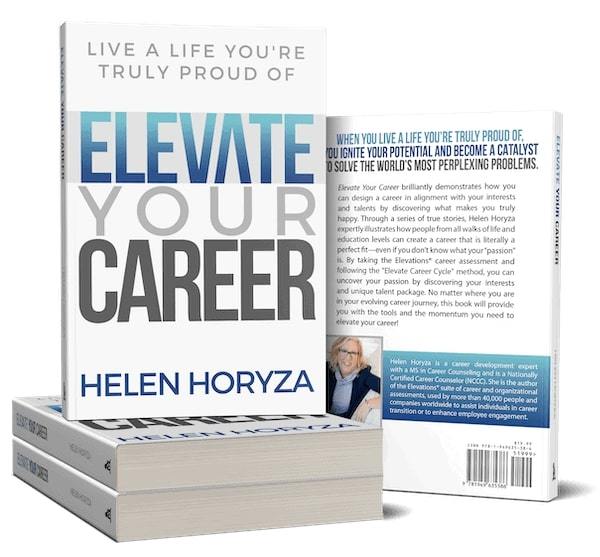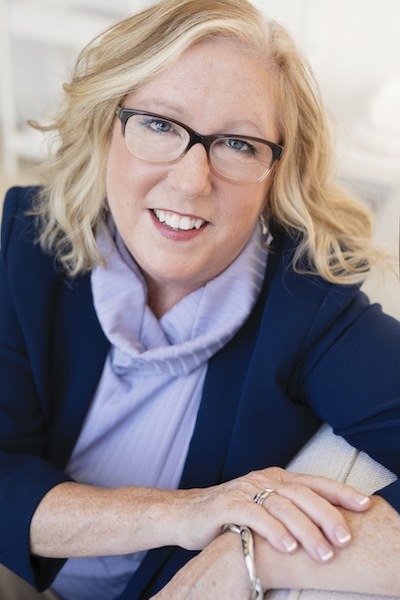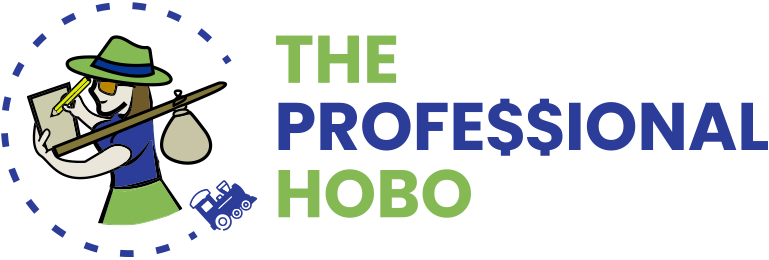There are many reasons why you might want to change your career at the moment. Have you been laid off? Has your business been affected by the pandemic and you are looking for a way to “pivot” or reinvent yourself? Or are you eager to jump on the remote work wave and design a career that will (eventually) allow you to travel the world as a digital nomad?

This article was originally published in 2020. It has since been updated for accuracy of links and content.
You are not alone. (I am talking to myself as much as to you.) But we sure may feel like it, especially when (given the first two examples above) circumstances out of our control ripped our careers out from under us and on top of everything we feel isolated and lost. The pandemic has been a tough haul for many people, myself included.
Long-standing readers may have noticed that I’ve shifted away from personal narratives since the pandemic began. This is because I’ve had a hard time dealing with the unknowns that 2020 dealt me. For example:
- I’m so grateful to have a home base in Canada, but being locked down and isolated in it wasn’t something I’d anticipated nor yearned for. As much as I’m an introvert, somewhere around the three month mark the isolation started taking a toll.
- Because of closed borders I’ve been separated from my partner (who is American) since before the pandemic began, with no idea when (or how, or where) we will reunite.
But perhaps most unsettling for me has been the (temporary?) collapse of the travel industry as we know it. In March 2020 I lost half of my traffic (and more than half my income). In May, Google released an algorithm update that slashed everything by another 50%.
Somewhere around there a heroic dose of situational depression enshrouded me. I found myself wondering if I even had it in me to persevere with this website and related online business.
I’ve been here before. In 2017 I created a very personal video in which I acknowledged that I wasn’t sure I had what it took to stay in the travel blogging game (and in the video I even refer to a previous incantation of the same problem in 2014). I’d been dealt a few blows at that time, and wasn’t sure I could recover, or perhaps more accurately, I wasn’t sure I wanted to do what it would take to recover.
Fast forward three years. I did do what it took to recover, and it was a ton of hard work, but as we rang in 2020, my online business was doing better than it ever had.
Here’s where irony bears its gnarly teeth: while internally I recognized that I was ready to make a shift in my career and business, I had decided I would take it easy in 2020 and reap the benefits of all the hard work and money I’d invested in my site over the previous three years.
Enter Covid-19. The benefits I’d hoped to reap all but disappeared.
But this is not a pity party. Many people have it far worse than I (I have a friend whose business collapse has forced her into total bankruptcy). And a fair few people have it better (I have a friend who works in the hand sanitizer business).
There is a school of thought that says we get what we need when we need it. And while we all needed the pandemic like we needed a hole in the head, in the right frame of mind I can personally see it as an opportunity to reevaluate where I’m at with my career and look at my career options, including being open to making a career change.
That’s when I came across Elevate Your Career: Live a Life You’re Truly Proud Of. It’s a book plus career assessment tool combo that I found to be both interesting and inspirational. And given the current climate where a lot of people are looking at having to pivot their careers or even to reinvent themselves entirely, I think it’s a tool that could be useful to many people. So much so, that I contacted the author (Helen Horyza) and asked her to help me better understand how to embrace change and elevate your career, even in the face of adversity. Horyza holds a Master of Science degree in Career Counseling, is a professionally trained coach, a Nationally Certified Career Counselor (NCCC), and has over 20 years of experience uncovering talent and directing it to achieve extraordinary results. So, she knows what she’s talking about.
Let’s discuss, shall we?

The above image is Horyza’s Elevate Career Cycle model, points of which I’ll refer to throughout this article. It includes four stages with associated strategic actions. The stages are: Crossroad, Journey, Contract, and Home. Between the stages are strategic action steps designed to move you forward in the Cycle: Introspect, Connect, Emerge, and Evolve.
Changing Your Career: 7 Steps to Elevate Your Career (When You’ve Been Bamboozled)
Horyza doesn’t outline these seven steps to elevate your career specifically in her book; I compiled them from our conversation, her book, and some corner of my brain that thinks I know what I’m talking about because I’ve done a whole pile of career assessments and changed my own career a bunch of times in my life due to various bamboozlements.
Step 1: Don’t Panic!
This is what Horzya says if you are faced with a challenging career transition such as being laid off. She also acknowledges that not panicking is easier said than done.
“You’ve had something awful happen and you did nothing wrong. Not only will things be okay, but possibly things may be even better,” says Horyza. But if you don’t calm down long enough to explore your options, you won’t find them.
“So many of us were going full throttle when this happened. So it’s going to take energy, resourcefulness, creativity, possibly asking for help.” These are further explored in the following steps.
The Crossroads stage of Horyza’s Elevate Career Cycle model will come as a big sigh of relief to many readers, who might otherwise want to give up or think they’re broken. Career transitions aren’t easy at the best of times and we need to give ourselves space and time to go through it; something many other career cycle models don’t acknowledge.
“Because career transitions spike anxiety, and most of us are experiencing some sort of dissatisfaction, we get impatient. And a lot of us just want to fill that gap. It’s rewarding, but it knocks strategy out. So, by following my model I’m acknowledging your psychology, but I’m also holding back your maverick and saying okay let’s do this really smart.”
Step 2: Get Yourself as Mentally Strong as Possible
It takes a while to sort through your emotions when you’re in a career transition, especially when you’ve been hit from all sides as the pandemic has done to many of us. Getting mentally strong involves pulling back the victimhood and getting out of that emotional place where you feel the world has done you wrong.
“Bad things happen. But you’re the one who pays the price for being upset about things you can’t control. Take an accountable perspective; stop blaming and making excuses under all circumstances. It’s up to you – it’s your life!” starts Horyza.
She continues by saying the reason you need to be mentally strong is because the biggest commodity in your life and career is you.
“You’re the resource, whether you like it or not! It’s up to you. And some people will have to get real and say ‘I’m done. This [career/industry] isn’t going to come back’.”
That’s a tough nut for anybody to swallow, especially if you want to acknowledge it from a place of mental and emotional fortitude. So I asked Horyza how to get mentally strong. She suggests considering where your inner “grit” comes from and figuring out how to manufacture it from within. For her, it’s a matter of reciting her top three values every morning before getting out of bed (she says you can also put them on your wall so you’re constantly reminded of them). Your values are your decision filter, and focusing on them will put energy back into something that’s significant to you, which in turn will improve your mental stability.
If you’re unsure of what your top three values are, never fear: the Elevations® Career Assessment (value of $35, included for free with the book) will help you get clear on your values, skills, and career interests; tying together these three categories will reveal your dominant temperaments (your personality themes) which help you determine what kinds of careers are best suited to you.
Step 3: Consider “Just” Paying the Bills
While you’re working on your mental and emotional health, getting a “grunt job” to tide you over is not a sign of failure.
“You have to slow down and move into the Introspection stage long enough to make the best choice of the choices available to you. And some of those choices might be just a paycheque and there’s nothing wrong with that. You’ll never find a career coach who will say that! But I think there’s dignity in paying your bills. And if that’s what you can do right now, that’s fantastic,” says Horyza.
Whether this job is a temporary measure or a more permanent move is up to you. Changing careers while paying attention to psychology and strategy is not usually a quick and easy solution. It requires courage, homework, and research. Getting an interim job can help take the pressure off.
Personally I admit that while the freedom and flexibility of being an online entrepreneur is not to be underestimated, there are times when I yearn for a job that allows me to clock in, clock out, and most importantly, to leave work at work. I don’t remember the last time I truly took a weekend (or any two days in a row) completely off.
Step 4: Focus on your Values and Interests
Here is where we get into the meat of exploring your inner landscape to determine what’s important to you, and then to find ways to correlate it with the current markets. The career assessment tool Horyza designed culminates in the Elevations® report which helps with this. From it, you can extrapolate key information like your top values, enjoyable skills, and some of the careers that interest you the most. Then, you can review your personality temperament profile to identify your strengths.
I asked Horyza where somebody who has no idea what career(s) to explore can start. She suggests starting with your interests. It may not be sexy, but it’s effective. “You might say ‘I like dogs; I like flowers; I like coffee’; now, how do I monetize that passion?”
When taking the career assessment, don’t be practical. Pick anything that interests you. Then, take the interests that it spits out and research what people do with those kinds of things.
I am regularly (almost daily) contacted by readers who are inspired by my location independent travel lifestyle and want to develop careers that will allow them to travel long-term or full-time as I have done since 2006. The gist of their emails is generally OMG I love what you do! How do I do it myself?
This is, of course, an impossible question to answer. So I asked Horyza what advice she has for somebody searching for a career to match their (location independent) lifestyle ambitions without any clue what career to pursue. She says: “Don’t go outside of yourself looking for travel-based careers. Turn it around and get really fascinated by YOUR montage.”
A close friend of mine is a casualty of the danger of looking for a career to match lifestyle ambitions without first having done the groundwork around personal interests and skills. In pursuit of the digital nomad lifestyle, he ended up chasing a lot of ideas (and spending a lot of money on online courses) that didn’t culminate into anything because they didn’t truly match his core interests and values. For example, he eventually realized that sedentary work isn’t for him, because there’s no feeling of productivity. (This is not a good match for the digital nomad lifestyle which almost always involves long hours in front of a computer). Only when he started looking at his core values, skills, personality temperament, and career interests, was he able to figure out what might make him happy. And only at that point was he able to start to design his lifestyle around it. He may never be a full-time digital nomad, but with an open mind to different ways of living and working, he can still design a career around long-term travel.
See also: How to Make Money While Traveling
Step 5: Keep Your Expectations in Check
I did a double-take at this point in our conversation, when Horyza doled out some advice that I’ve never heard before: “I don’t believe in ‘do what you love and the money will follow’; I think that’s dangerous.”
– picture me looking really shocked here –
Once I picked my jaw up off the floor, I actually found this refreshing advice since I think there’s a bit too much pressure to find the perfect expression of your passion in a career. Sometimes, there simply isn’t a way to monetize your passion. Other times, there may be a way to monetize it, but it comes at a disproportionate cost.
Sometimes, when you take something you love and you turn it into a job, it loses its lustre. I myself have experienced this with my former career in acting/singing/dancing, and also, frankly, a bit with my current career in travel blogging and content creation. I don’t think any career is perfect, and ideas of having a job that you love 100% of is, in my experience, delusional.
Horyza echoes this in her book:
“Your career needs to be compatible with your temperament, values, enjoyable skills, and career interests 60% of the time for you to be highly satisfied. (40% of the career might be stuff you really don’t enjoy doing. Even a rock star has to contend with a brutal schedule, loss of privacy, and uncomfortable sleeping arrangements. That is a rock star’s 40%. Take this as a generalization that will not always hold up).”
Step 6: Get a Buddy (or a Coach)
When I took the career assessment, I didn’t follow the advice in Step 4 in that I was more practical than perhaps I should have been. I chose answers and careers that were more of a reflection of things I’ve already done (which are many) than things I want to do (but perhaps am not qualified or educated for). So, the assessment showed me more about where I am now than where I could possibly go from here.
This is a universal problem I’ve had with every career assessment I’ve done; I don’t tend to find them illuminating enough in and of themselves for me to know what career I’m destined for.
I asked Horyza for her advice. She said the answer is probably right in front of me but I can’t see it. “It might be helpful to have a brilliant friend or coach who can pull you into a slightly different channel; something very close to what you’re already doing but feels unattainable because you can’t see it or you’ve dismissed it. Find somebody who can help you with that shift.”
While you might now start thinking that Horyza created Elevate Your Career as a ploy to get new clients, you would be wrong. In fact, she has closed her private practice in favour of reaching wider audiences through speaking, books, and a course that certifies people to become career coaches called the Career Coach Entrepreneur Academy.
Step 7: Take Advantage of Resources
Not everybody can afford to hire a career coach, especially if they’ve been laid off. Horyza recognizes this in her book and suggests alternatives, including finding a friend (as suggested above) who can offer you some perspective. She also outlines exercises you can do along with practical actionable advice.
In our conversation, she made some additional suggestions:
- Create a job search support circle and mastermind group; everybody can study the Elevate Your Career book and assessment and share their results and reflections.
- Horyza’s YouTube channel has a wide selection of free videos that provide career coaching advice based on the Elevations Career Cycle Model.
- Look at free resources in your area. As an example, Horyza mentioned that the state of California is currently offering a program that subsidizes certain educational pursuits; she said it’s basically a way to get a master’s degree for free.
The Future of Remote Work and the Digital Nomad “Industry”
I’m no soothsayer. But in this interview (and even more so in this podcast), I share my predictions for the future of the digital nomad lifestyle. In short, I believe it’s bright, with a huge number of companies having shifted to a remote working model (initially to survive global lockdowns, and subsequently because it makes more economic sense).
While I don’t think the digital nomad lifestyle in its purest form (as in being proverbially homeless and traveling full-time) is what most people will do, remote work will allow people to travel long-term and otherwise alter their lifestyles to be more fulfilling.
This means that somebody looking for a new career can, with the right tools and introspection, find something that will be rewarding and will allow them to live a lifestyle they formerly thought unattainable.

How to Elevate Your Career and Live a Life You’re Truly Proud Of
Horyza’s book Elevate Your Career is an easy and enjoyable read that leans on her decades of experience as a career counsellor and coach. So she illustrates abstract concepts with real-world examples that both entertaining and helpful.
In addition to these real-world examples, Elevate Your Career includes valuable tools that readers can use right away to reassess their career paths. First, the Elevate Career Cycle method (pictured earlier), which is explained in the book, can help readers uncover their passion by pinpointing their interests and unique talents. Also included with the book is a coupon code for a free Elevations® Career Assessment (value $35), which synthesizes values, skills, interests and personality in the context of contemporary careers. Individuals who complete the assessment receive a focused report complete with valuable decision-making tools. The result is a comprehensive model for smart and healthy career development.
She also has a chapter on the 21st century labour market that doesn’t need to be updated for our post-pandemic world. It includes her thoughts on unpredictability, and how looking for somebody else (like an employer) to take care of you for the rest of your life is a foolish choice. In so doing, she empowers readers to take their careers and lives into their own hands. And it starts with taking responsibility for how you react to what life throws your way (ie: don’t be an angry victim as touched on in Step 1 above).
She gently walks you through each stage of the Elevate Career Cycle, and how you might be feeling in each stage. The personality temperaments are fascinating to read, and the career assessment works hand-in-hand with the book; once you know your temperament, certain sections of the book become even more meaningful to read and re-read.
I’ll finish off with some words of hope, as quoted from the book:
I’m often asked this question in workshops, “How would the planet change if everyone was doing work they are gifted to do?” The answers are endless. We would need far less anti-depressants, crime would go down, poverty would be diminished, wealth would be more fairly distributed, wars might not be sustainable as people have fulfillment and purpose, hate and discrimination would be replaced with compassion, climate change would be taken seriously, and energy would be placed toward solving the real problems that threaten our existence.

Get your copy of Elevate Your Career here.
I received a free copy of the book for review, and the links in this article are affiliate links, meaning I’ll be paid a (minuscule yet appreciated) commission if you make a purchase.
You Might Also Be Interested In:
How I Became The Professional Hobo
Lifestyle Inflation: Why Earning More Money Sucks (the Life Outta You)



It looks like you travel base folks took a big hit on this one and it’s not just the travel based businesses either. This will fade as they find something new to follow in the news but that won’t make up for the last 7 months.
I did see that Canada was semi opening their border to people who had a reason to be there, maybe your partner will be allowed in?
I hope this works out for you Nora, I really enjoy your writings and view of the world.
Thanks for your support, Rob. Indeed, travel isn’t the only industry affected.
And yes, hopefully my partner will be able to get special permission to come to Canada. Let’s see!
Hi Nora. When this pandemic hit I thought how timely it was that you had finally made a home/base in Canada and were not caught out in some country you may not have enjoyed lockdown in. I also wondered how you were coping with your wings clipped! I got a bit tetchy as I was going to go to Morocco, had 2 VT’s booked in towns I hadn’t been to in Spain, then Stockholm and Russia. I nearly braved the covid19 in Spain but the 14 days quarantine on return costing $3,100 (NZ) was too much…..more than the return fare to Europe!! So here I sit, like you! We do have domestic travel…..but Ive been to most of NZ and the old best friends are dropping off the perch so not such fun any more. Life I guess! I entertain myself by selling my home….that gives me a financial boost as well! Your article and the book sound interesting…..may buy it for my son…..no acting going on now in US. It sounds like a book I should have read years ago. ?. I fear I haven’t cheered you up…..be thankful you dont live in the US. I am hoping to be very happy in 22 days! You could always come to covid free NZ and do that retreat in Coromandel again……still snow in S.I. for skiing and summer is coming……oh….$3,100. Maybe not…..sorry. I will stop rambling on. Good luck Nora and love and hugs to you…..happy to hear “partner”. ?
Hi Jo!
Always a pleasure to hear from you.
Much as I would LOVE to grace NZ’s shores again, my understanding is the border is very tightly closed to outsiders….and rightly so. I bid NZ to continue to enjoy no cases and a “normal” life while we all futz about with second waves and such.
And, yes, having my wings clipped has been a bit frustrating, however the silver lining is that for the first time in a few years I have a new pep of enthusiasm and zest for adventure for when I do eventually hit the road. For a while there I was so burned out and exhausted that it was all I could do to get to a destination and dig my heels in, with little desire to explore much beyond the neighbourhood I was staying in.
So….silver linings!
I don’t know many people who would sell their house to entertain themselves…you’re one of a kind, Jo! Ha ha!